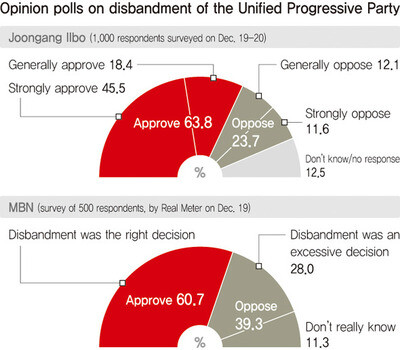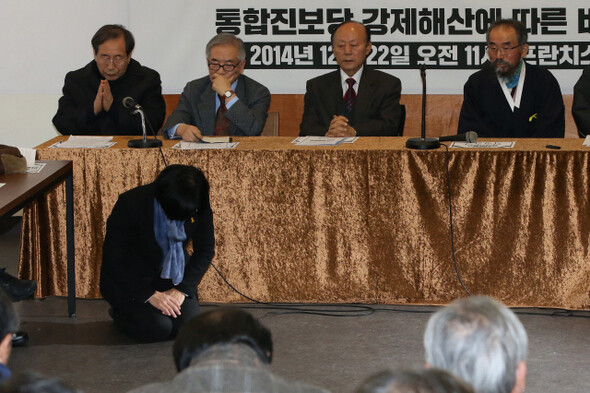hankyoreh
Links to other country sites 다른 나라 사이트 링크
Public opinion mostly supportive of UPP disbandment

Public opinion polls are showing strong public support for the Constitutional Court’s decision to disband the Unified Progressive Party (UPP). This is hard to swallow for South Korean progressives, who believe the court arrogantly and violently trampled on the democratic principle that parties are chosen through public elections.
Public opinion polls show that support for the court‘s decision generally outweighed dissent by a margin of 2 to 1. In a poll conducted by the Joongang Ilbo newspaper on Dec. 19 and 20, 63.8% of respondents agreed with the court’s decision to disband the UPP, with 23.7% opposed.
In a poll that Real Meter carried out for Maeil Business Newspaper on Dec. 19, 60.7% of respondents thought that the disbandment of the party was the “right decision,” more than double the number who thought the decision was excessive (28.0%).
The results were similar in a Dec. 19 survey by polling organization Human Research. In this poll, 54.6% thought the court had chosen wisely, with 35.5% disappointed by its decision.
In general, experts are drawing two conclusions from these polling results. One is the inherent limitations of these polls, and the other is the political failure of the UPP.
The polls were limited, experts say, because the questions of all three polling organizations failed to address the complex political implications of the court’s decision. All three posed the simple question of whether respondents agreed or disagreed with the court’s decision.
For this reason, respondents were likely to simply decide whether or not the UPP ought to be disbanded according to their feelings about the party, instead of thinking about the broader ramifications of the unprecedented decision to disband a political party. In other words, these polls were influenced by respondents‘ existing bias for or against the UPP, in addition to their actual approval or disapproval of the court’s decision.
“It is one thing to hate the Unified Progressive Party so much that you think it should be disbanded and quite another to believe it was appropriate for the UPP to be disbanded by force by the Constitutional Court, a state institution. If pollsters had asked respondents if they thought it was right for the UPP to be forced to disband through a decision of the Constitutional Court instead of being voted out of power in an election, the results could have been quite different,” said Seo Bok-kyung, analyst at the Sogang Institute of Political Studies.
Seo thinks that even people who were so biased against the UPP that they thought it ought to be disbanded might have responded differently if given the choice between people voting against it in an election and the state disbanding it by force.
But the polls do make it impossible to deny that a considerable number of South Koreans felt so much antipathy for the UPP that they supported a court ban on the party. As a result, some experts say, it is necessary to ask why so many South Koreans were disgusted with the UPP, a question that is separate from the political implications of the court‘s decision.
In the view of Jang Deok-jin, professor of sociology at Seoul National University, “The UPP is largely to blame for failing at practical politics.”
“Considering that Korea is a divided country, it’s undeniable that there is little tolerance - and considerable hostility - in Korean society for behavior and ideology that could be framed as pro-North Korea. In practical political terms, the UPP signed its own death warrant when it failed to clearly distance itself from the behavior of radical elements inside the party,” Jang said.

“At the least, the party should have criticized Lee Seok-ki’s group,” said Noh Hoi-chan, former head of the Justice Party, referring to the so-called RO (revolutionary organization). By so doing, Noh believes, it could have prevented the majority of the public from confusing the entire party with one element of the party that was sympathetic to North Korea.
“There were points when the Unified Progressive Party failed to make an effort to capture the hearts of the public as a popular party. Regardless of whether the Constitutional Court’s decision was justified, this is something that Korean progressives will have to ponder in the future,” said Kim Wook, professor of political science at Pai Chai University.
By Son Won-je, staff reporter
Please direct questions or comments to [english@hani.co.kr]

Editorial・opinion
![[Column] Season 2 of special prosecutor probe may be coming to Korea soon [Column] Season 2 of special prosecutor probe may be coming to Korea soon](https://flexible.img.hani.co.kr/flexible/normal/500/300/imgdb/original/2024/0426/3317141030699447.jpg) [Column] Season 2 of special prosecutor probe may be coming to Korea soon
[Column] Season 2 of special prosecutor probe may be coming to Korea soon![[Column] Park Geun-hye déjà vu in Yoon Suk-yeol [Column] Park Geun-hye déjà vu in Yoon Suk-yeol](https://flexible.img.hani.co.kr/flexible/normal/500/300/imgdb/original/2024/0424/651713945113788.jpg) [Column] Park Geun-hye déjà vu in Yoon Suk-yeol
[Column] Park Geun-hye déjà vu in Yoon Suk-yeol- [Editorial] New weight of N. Korea’s nuclear threats makes dialogue all the more urgent
- [Guest essay] The real reason Korea’s new right wants to dub Rhee a founding father
- [Column] ‘Choson’: Is it time we start referring to N. Korea in its own terms?
- [Editorial] Japan’s rewriting of history with Korea has gone too far
- [Column] The president’s questionable capacity for dialogue
- [Column] Are chaebol firms just pizza pies for families to divvy up as they please?
- [Column] Has Korea, too, crossed the Rubicon on China?
- [Correspondent’s column] In Japan’s alliance with US, echoes of its past alliances with UK
Most viewed articles
- 1[Column] Season 2 of special prosecutor probe may be coming to Korea soon
- 2‘We must say no’: Seoul defense chief on Korean, USFK involvement in hypothetical Taiwan crisis
- 3Division commander ordered troops to enter raging flood waters before Marine died, survivor says
- 4Is N. Korea threatening to test nukes in response to possible new US-led sanctions body?
- 5Is Japan about to snatch control of Line messenger from Korea’s Naver?
- 6No good, very bad game for Korea puts it out of Olympics for first time since 1988
- 7[Editorial] Korea’s surprise Q1 growth requires objective assessment, not blind fanfare
- 8Korea’s 1.3% growth in Q1 signals ‘textbook’ return to growth, says government
- 9N. Korean delegation’s trip to Iran shows how Pyongyang is leveraging ties with Moscow
- 10Amnesty notes ‘erosion’ of freedom of expression in Korea in annual human rights report